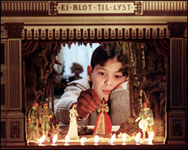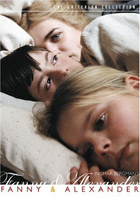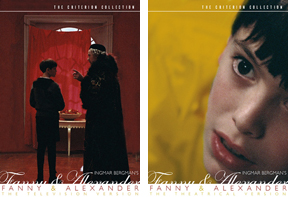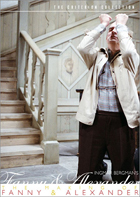Fanny and Alexander [DVD]
|
 Fanny and Alexander occupies a somewhat strange space in legendary Swedish director Ingmar Bergman's filmography. It is most often thought of as his final film, the pinnacle of his distinguished career and a hearty summation of all his filmic and thematic fascinations. And, to a certain extent, this is all true. It was his last film, if by that we mean feature films intended for theatrical distribution. However, since Fanny and Alexander, Bergman has written and directed nine films for television and written three additional scripts directed by others. Hardly the end of his film career.
Fanny and Alexander occupies a somewhat strange space in legendary Swedish director Ingmar Bergman's filmography. It is most often thought of as his final film, the pinnacle of his distinguished career and a hearty summation of all his filmic and thematic fascinations. And, to a certain extent, this is all true. It was his last film, if by that we mean feature films intended for theatrical distribution. However, since Fanny and Alexander, Bergman has written and directed nine films for television and written three additional scripts directed by others. Hardly the end of his film career.
Yet, it is hard not to see Fanny and Alexander as a grand final statement on Bergman's part, the fitting capstone of an extraordinary, virtually unrivaled filmmaking career. Bergman himself has referred to it as "the sum total" of his life as a filmmaker, and as it is replete with autobiographical touches, it also reflects his feelings about life beyond the camera lens. At a cost of $6 million, it was the most expensive film made in Sweden up until that time, and it marked Bergman's triumphant return to filmmaking in his homeland after years of exile due to a tax dispute with the government that was later revealed to have been unfounded. Fanny and Alexander is an epic film in length, running over five hours in the original version aired on Swedish television and over three hours in its shortened theatrical form. Yet, it's deeply intimate, focusing as it does on a single family. It's a mixture of comedy and tragedy, reality and fantasy--in other words, it's like all the bits of Bergman's other films thrown into a blender, with the miraculous artistry being how well it all holds together despite its shifts in tone and point of view. Although the title Fanny and Alexander would seem to suggest a focus on the titular children, 8-year-old Fanny (Pernilla Allwin) and 10-year-old Alexander (Bertil Guve), the film is really an ensemble piece with more than a dozen major characters. The story, which takes place near the turn of the 20th century, begins on Christmas Eve, and Bergman uses the film's first hour to slowly introduce us to all the members of upper-class Ekdahl family, which is presided over by the widowed matriarch, Helena (Gun Wållgren). Helena has three sons, who are widely different in temperament. Oscar (Allan Edwall), the father of Fanny and Alexander, is the exuberant leader of the family's theater troupe; his wife, Emilie (Ewa Fröling), is the troupe's beautiful leading actress. Gustav Adolf (Jarl Kulle) is boisterous and lusty, and he is lucky enough to be married to a woman who consciously overlooks his middle-age-crazy sexual antics. And then there's Carl (Börje Ahlstedt), the underachiever who is constantly in debt and unfairly takes out his anger and frustration with life on his too-eager-to-please wife. The film's early passages are bright and lively, filled to the point of bursting with detail and splendor and charm. Even in moments of anguish and pain, there is always the sense of life and emotion; this is truly a film that has a soul. The large apartment in which Helena lives was based on Bergman's childhood memories of his grandmother's apartment, and his affection for the space and everything that fills it enhances and extends his vision into the realm of the spiritual. Alexander is Bergman's cinematic stand-in, a bright, inquisitive boy with a firm sense of self, and it is often through his eyes that we see the action. Of course, there are many activities that go on beyond the world of the children, such as Carl's fighting with his wife, Gustav Adolf's lusty rendezvous with one of the maids, Maj (Pernilla Wallgren), and Helena's late-night conversation with her longtime confidante and lover, Isak Jacobi (Erland Josephson), a mystical Jewish shopkeeper. The liveliness of these early passages is sharply contrasted with the film's second act, in which Emilie marries a stern bishop named Edvard Vergérus (Jan Malmsjö) after Oscar unexpectedly passes away. Edvard lives in a cold, colorless castle that is more of a prison than a home. The film takes on the tone of a fairy tale at this point (or a horror movie), positioning Fanny and Alexander as unwitting prisoners of their dour stepfather and his creepy family, which includes a brooding mother, a bitter spinster sister, and a corpulent, bed-ridden aunt who is more monster than human. Edvard is a thoroughly infuriating character, one who wears his religious position as a mask to hide his hypocrisy and selfishness. He is the worst kind of religious figure, one whose security in his faith leads him to a sense of smug self-righteousness and superiority that he uses to justify his rigid sadism. He and Alexander immediately clash, as the boy's willfulness and own sense of self come into conflict with Edvard's demands of complete submission. While Bergman verges on the melodramatic in these scenes, they are always effective because they stand in such contrast to Ekdahl family. However flawed the Ekdahls may be, there is always a sense of love and cohesion, whereas Edvard's family exudes alienation and despair, even from those in power. Throughout the film, Bergman weaves moments of the fantastical into the lush texture of his world gone by, whether it be Alexander seeing a statue move its arm or the multiple reappearances of Oscar in ghostly form to several family members. At one point, Isak Jacobi even summons a form of magic to help Fanny and Alexander escape Edvard's clutches. Bergman doesn't draw attention to these moments of the fantastical, but rather presents them as just another element of lived experience, underscoring his fascination with the expansiveness of life in both this world and beyond. Fanny and Alexander is indeed a great summation of Bergman's career, but more importantly it is a great film on its own. Even without Bergman's previous four decades of filmmaking as its foundation, Fanny and Alexander is a glorious and tender evocation of life, love, and family in both times of happiness and times of trial and tribulation. Never before nor since has Bergman merged the joys and terrors and wonders of life into such a rich and rewarding cinematic tapestry.
Copyright ©2005 James Kendrick All images copyright © The Criterion Collection | ||||||||||||||||||||||||||||||||||||||||||||||
Overall Rating:



 (3.5)
(3.5)
Subscribe and Follow
Get a daily dose of Africa Leader news through our daily email, its complimentary and keeps you fully up to date with world and business news as well.
News RELEASES
Publish news of your business, community or sports group, personnel appointments, major event and more by submitting a news release to Africa Leader.
More Information

 This five-disc box set contains both the 312-minute television version of the film and the 188-minute version shown in theaters internationally.
This five-disc box set contains both the 312-minute television version of the film and the 188-minute version shown in theaters internationally. As a five-disc box set, Criterion's edition of Fanny and Alexander is bursting with supplements. The biggest is the inclusion of Bergman's feature-length 1986 documentary The Making of Fanny and Alexander, although I hesitate to call it a "supplement" since it's such a great film in its own right. With complete behind-the-scenes access, the film chronicles the production of Fanny and Alexander from beginning to end, which allows us an unparalleled look at Bergman working in his element. This set also contains a gallery of costume sketches by Oscar-winning costume designer Marik Vos and video footage of set model by Oscar-winning art director Anna Asp, as well as a gallery of production photographs. A Bergman Tapestry: Fanny and Alexander is a newly produced documentary that features recent interviews with a number of members of the cast and crew, including stars Ewa Fröling, Erland Josephson, and Bertil Guve, who, now in his 30s, looks remarkably like Guy Pearce. Peter Cowie offers another of his excellent screen-specific audio commentaries on the theatrical version of the film. As he has on his previous Criterion work, including Luchino Visconti's The Leopard and Bergman's Wild Strawberries, Cowie places the film in its historical context, adding to its depth with information about Bergman and the film's production while also providing insightful analysis of the film's formal elements. Bergman himself is frequently present in the supplements, particularly in a 60-minute interview titled Ingmar Bergman Bids Farewell to Film made for Swedish television in 1984. He also appears in short, but candid introductions to 11 of his films that were shot in 2003 for use on Swedish television (the intro for Smiles of a Summer Night has already appeared on Criterion's disc for that film). Together, the introductions run for about an hour. And, while the box lists a collection of theatrical trailers as a supplement, I was unable to find them anywhere.
As a five-disc box set, Criterion's edition of Fanny and Alexander is bursting with supplements. The biggest is the inclusion of Bergman's feature-length 1986 documentary The Making of Fanny and Alexander, although I hesitate to call it a "supplement" since it's such a great film in its own right. With complete behind-the-scenes access, the film chronicles the production of Fanny and Alexander from beginning to end, which allows us an unparalleled look at Bergman working in his element. This set also contains a gallery of costume sketches by Oscar-winning costume designer Marik Vos and video footage of set model by Oscar-winning art director Anna Asp, as well as a gallery of production photographs. A Bergman Tapestry: Fanny and Alexander is a newly produced documentary that features recent interviews with a number of members of the cast and crew, including stars Ewa Fröling, Erland Josephson, and Bertil Guve, who, now in his 30s, looks remarkably like Guy Pearce. Peter Cowie offers another of his excellent screen-specific audio commentaries on the theatrical version of the film. As he has on his previous Criterion work, including Luchino Visconti's The Leopard and Bergman's Wild Strawberries, Cowie places the film in its historical context, adding to its depth with information about Bergman and the film's production while also providing insightful analysis of the film's formal elements. Bergman himself is frequently present in the supplements, particularly in a 60-minute interview titled Ingmar Bergman Bids Farewell to Film made for Swedish television in 1984. He also appears in short, but candid introductions to 11 of his films that were shot in 2003 for use on Swedish television (the intro for Smiles of a Summer Night has already appeared on Criterion's disc for that film). Together, the introductions run for about an hour. And, while the box lists a collection of theatrical trailers as a supplement, I was unable to find them anywhere.